
Myrna Joy "Jody" Miller was an American singer, who had commercial success in the genres of country, folk and pop. She was the second female artist to win a country music accolade from the Grammy Awards, which came off the success of her 1965 song "Queen of the House". By blending multiple genres together, Miller's music was considered influential for other music artists.
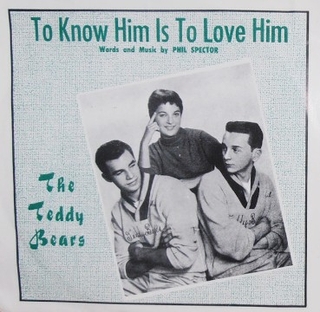
"To Know Him Is to Love Him" is a song written by Phil Spector, inspired by words on his father's tombstone, "To Know Him Was to Love Him." It was first recorded by the only vocal group of which he was a member, the Teddy Bears. Their recording spent three weeks at No. 1 on the Billboard Hot 100 chart in 1958, while reaching No. 2 on the UK's New Musical Express chart. Peter & Gordon and Bobby Vinton later had hits with the song, with its title and lyrics changed to "To Know You Is to Love You". In 1987, the song was resurrected by Dolly Parton, Linda Ronstadt, and Emmylou Harris, whose Trio recording topped the U.S. country singles chart.

The discography of American singer Jody Miller contains 21 studio albums, five compilation albums, one video album, one album appearance, one extended play (EP) and 57 singles. Of her 57 singles, 47 were issued with Miller as the lead artist, two were released as a collaboration, two were promotional singles and five were internationally-released singles.

The singles discography of American country artist, George Jones, contains 182 singles. Of the total, 136 were released with Jones as the solo artist. In addition, 31 were issued with Jones being part of a collaboration. Thirdly, eight singles were issued with Jones being part of a featured act. Fourthly, seven released were promotional singles. Additionally, 14 songs that are not released as singles are included that made any major chart. Finally, 21 music videos which were first issued as singles are also listed. Jones had his first chart success in 1955 with several top ten Billboard Hot Country Songs singles: "Why Baby Why", "What Am I Worth" and "You Gotta Be My Baby". After several more top ten releases, "White Lightning" became his first to top the Billboard country chart. Along with "Who Shot Sam", both singles were also his first to make the Hot 100 charts.
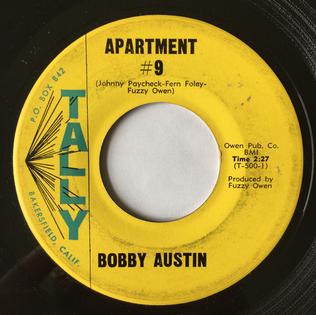
"Apartment No. 9" is a song written by Bobby Austin and Johnny Paycheck. It was originally recorded by American country musician Bobby Austin in 1966 and became a top 40 hit on the Billboard country songs chart.

"Good News" is a song originally recorded by American singer Jody Miller. It was composed by George Richey, Billy Sherrill and Norro Wilson. It was released as a single on Epic Records in 1973. It was among several singles by Miller to reach the top ten on the North American country music charts. It also served as the title track for Miller's 1973 album Good News!. It received a positive response from Cashbox magazine shortly after its release.

The singles discography of American country music artist Lynn Anderson contains 72 singles, three promotional singles, one charting B-side, two music videos and nine other song appearances. She signed her first recording contract with Chart Records in 1966. The following year, her single "Ride, Ride, Ride" debuted on the Billboard Hot Country Singles chart. Also in 1967, her single "If I Kiss You " became her first major hit when it reached number five on the country singles chart. Anderson had a series of hits that reached the top ten and 20 during the 1960s including "Promises, Promises" (1969), "No Another Time" (1968), "Big Girls Don't Cry" (1968) and "That's a No No" (1969).

Melba Montgomery is a self-titled studio album by American country artist, Melba Montgomery. It was released in October 1973 via Elektra Records and contained 12 tracks. The disc was Montgomery's first with the Elektra label and eighteenth album overall. Material on the album mixed both uptempo numbers with ballads. New selections along with cover songs were included. The album included two singles. The first single, "Wrap Your Love Around Me", reached the top 40 of the American country songs chart in 1973. The album received positive reception from Billboard magazine following its release.
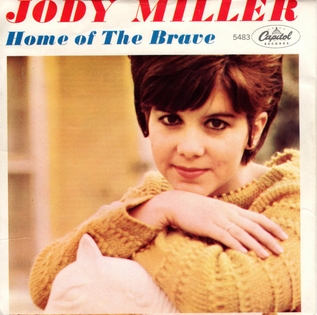
"Home of the Brave" is a song recorded and made successful by American singer Jody Miller. It was composed by songwriters Barry Mann and Cynthia Weil. Released as a single by Capitol Records in 1965, "Home of the Brave" reached the pop charts in the United States, Canada and Australia. It was characterized as a protest song for its discussion of social issues during the sixties decade. It was among Miller's most commercially successful recordings in her career despite being banned from radio stations. "Home of the Brave" was released on an album of the same name in 1965.
"Look at Mine" is a song originally recorded by American singer Jody Miller. Composed by Tony Hatch and Jackie Trent, it was released as a single on Epic Records in 1970. It reached the top 40 on the North American country charts, setting forth a series of commercially successful singles for Miller in the country genre. It received a positive response from Cashbox magazine shortly after its release.
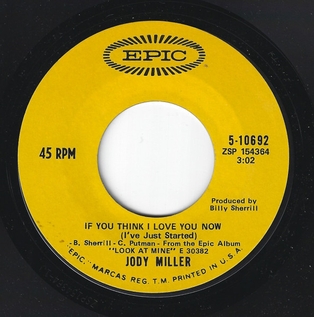
"If You Think I Love You Now (I've Just Started)" is a song originally recorded by American singer Jody Miller. Composed by Curly Putman and Billy Sherrill, it was released as a single on Epic Records in 1970. It reached the top 20 on the American country chart and the top 30 of the Canadian country chart. It received a positive response from Billboard magazine shortly after its release.
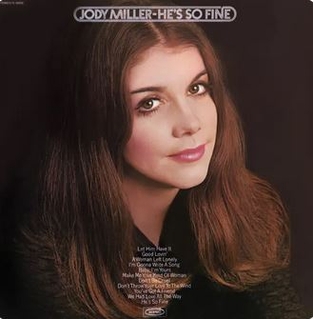
He's So Fine is a studio album by American singer Jody Miller. It was released in August 1971 via Epic Records and contained 11 tracks. A majority of the album's material were covers of country and pop songs. Two of its covers were originally released as singles: the title track and "Baby I'm Yours". Both reached the top ten of the North American country charts and reaches other chart positions. The album itself reached the top 20 of the American country chart in 1971.
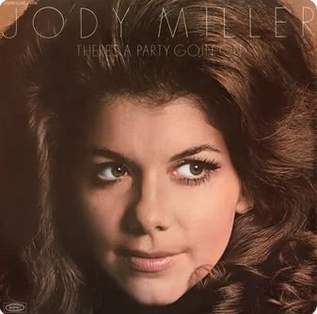
There's a Party Goin' On is a studio album by American singer Jody Miller. It was released in September 1972 via Epic Records and contained 11 tracks. The album blended country and pop songs. A series of popular country and pop cover recordings were included, along with some new material. There's a Party Goin' On reached the top 30 of the American country albums chart. A total of four singles were included on the album: "Be My Baby", "Let's All Go Down to the River", "There's a Party Goin' On" and "To Know Him is to Love Him". The title track was the most successful single from the album. The disc received positive reviews from publications following its release.

Good News! is a studio album by American singer Jody Miller. It was released in July 1973 on Epic Records and featured 11 tracks. The ninth studio album of her career, Good News! was a country-themed album mixing cover tunes with original material. Among its original songs were the singles "Good News" and "Darling, You Can Always Come Back Home". Both singles reached the top ten of the North American country charts in 1973. The album itself reached the top 20 on the American country chart in 1973. It was followed by a positive review from Billboard the same year.
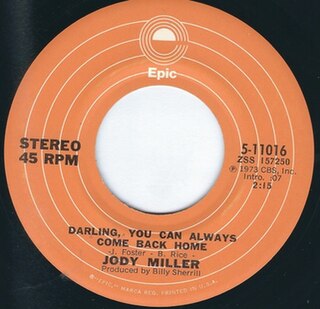
"Darling, You Can Always Come Back Home" is a song originally recorded by American singer Jody Miller. It was written by Jerry Foster and Bill Rice. It was released as a single on Epic Records in 1973. It was one of six singles by Miller to reach the top ten on the North American country music charts. It appeared on Miller's 1973 album Good News!.
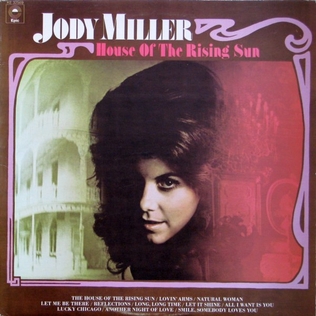
House of the Rising Sun is a studio album by American singer Jody Miller. It was released in January 1974 via Epic Records and contained 11 tracks. Marketed as a country album, its 11 songs mixed covers with original material. Among its covers was the title track, which was among the album's three charting singles. The album itself reached the American country chart in 1974. It received positive reviews from Billboard and Cashbox following its release.

Country Girl is a studio album by American singer Jody Miller. It was released in February 1975 via Epic Records and contained ten tracks of material. It was the eleventh studio album of Miller's career and was an album of country recordings. Among the recordings were two singles that reached the American country songs chart: the title track and "The Best in Me". Country Girl was met with favorable reviews from critics.
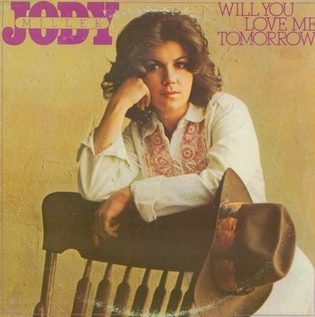
Will You Love Me Tomorrow? is a studio album by American singer Jody Miller. It was released in March 1976 via Epic Records and featured ten tracks. The album's material was mostly cover songs, along with several new tracks. Three of its covers were released as singles: "Don't Take It Away", "Will You Love Me Tomorrow" and "Ashes of Love". All three recordings reached charting positions on America's country songs charts between 1975 and 1976. Will You Love Tomorrow? received positive reviews from critics.
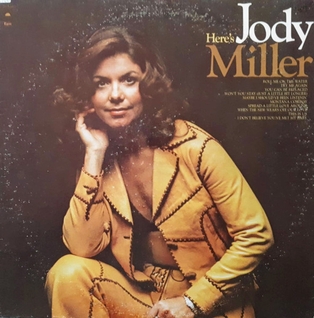
Here's Jody Miller is a studio album by American singer Jody Miller. It was released in March 1977 on Epic Records and featured ten tracks. The album included country material, two of which were singles. Its most successful was the top 25 American country chart record titled "When the New Wears Off Our Love". It was Miller's final album with the Epic label and her thirteenth album overall.
"When the New Wears Off Our Love" is a song written by Paul Craft that was originally recorded by American singer Jody Miller. It was released as a single on Epic Records in 1976. It was Miller's first top 40 entry on the American country music chart in three years and was her final to reach the top 40. It was later released on Miller's 1977 studio album Here's Jody Miller. The song was given positive reviews from publications following its release.


















